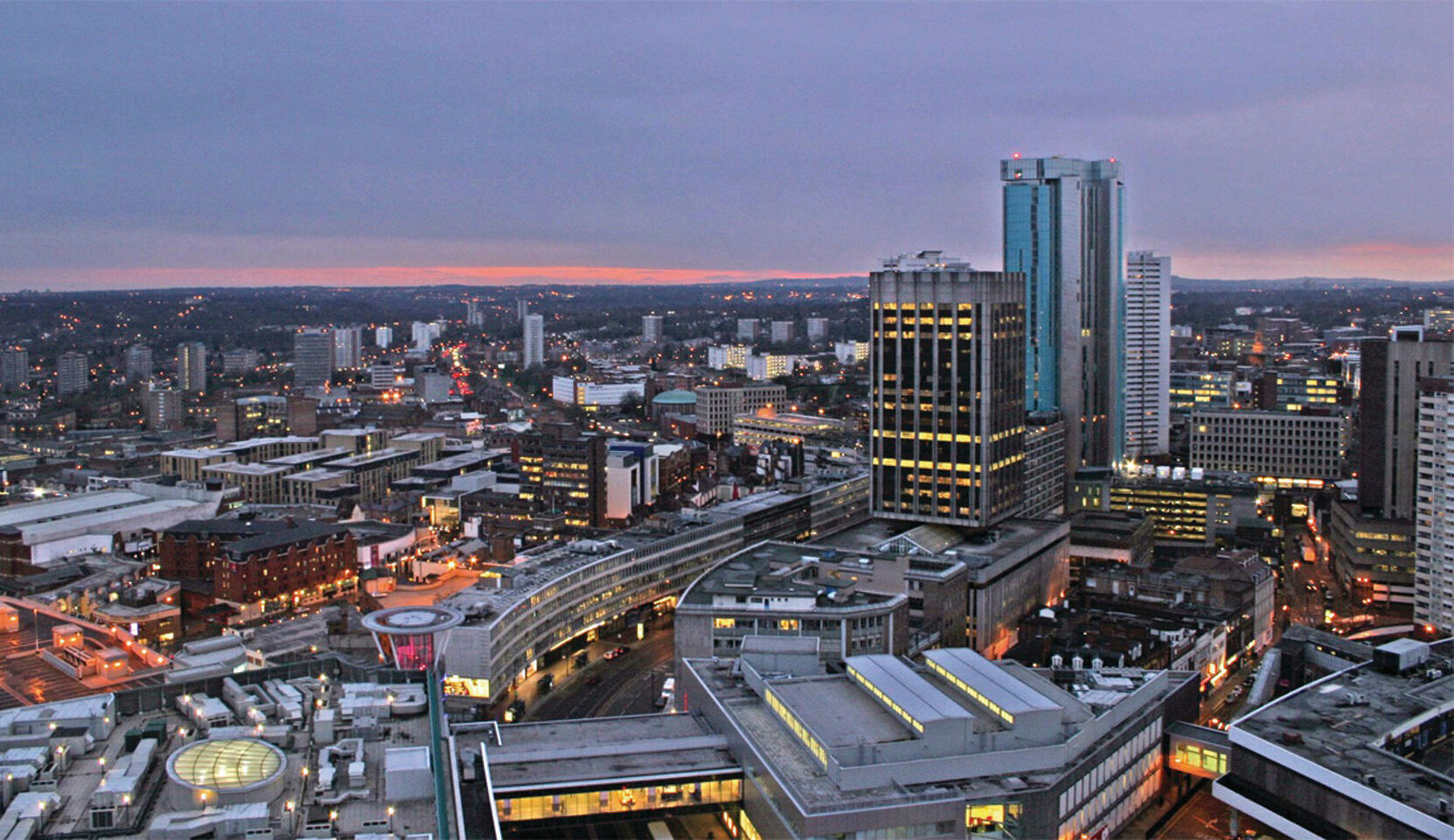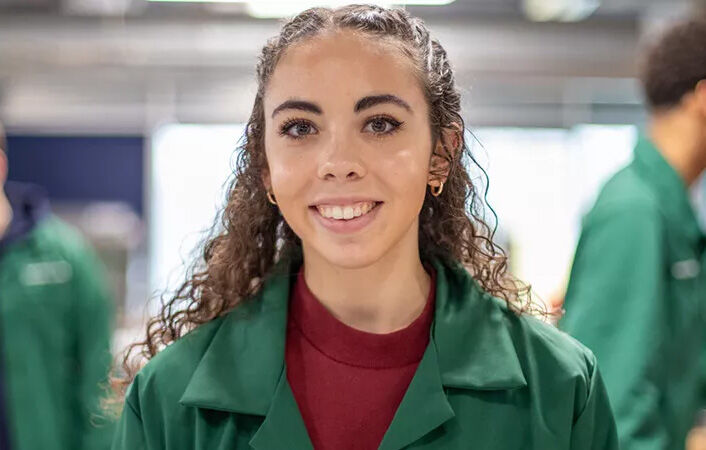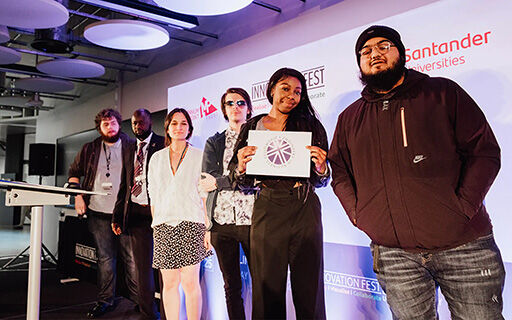
Civil Engineering - BEng (Hons)
Currently viewing course to start in 2026/27 Entry.
Want to become a Civil Engineer? Study our Civil Engineering BEng (Hons) degree course at Birmingham City University. This course is designed to meet the requirements of relevant professional bodies to give your career in civil engineering a head start. Much of your learning activity will be hands-on, with access to our strong industry links....
- Level Undergraduate
- Study mode Full Time
- Award BEng (Hons)
- Start date September 2026
- Fees View course fees
- Subjects
- Location City Centre
This course is:
Available with Professional Placement year
Open to International Students
Overview
Scholarships are available for this course. Find out more and apply now
Birmingham is the second largest city in the UK and is a great area for students to be in if you want to be in the built environment because there's redevelopment going on all around you and there's also a strong possibility that you could be working on these projects in the future. I've had a really good experience at BCU so far. We get to go on quite a lot of site visits. One of the biggest ones we've been on so far was the housing development by Taylor Wimpey, and we also had for our first assignment Taylor Wimpey's, managing director of the West Midlands, assessed one of our presentations. Support from lecturers is really, really good that always there, they're always there to reply to your emails no matter what the query is. They've all had real life experience, academic and industry wise, that we can learn from. One of the things that I'm most passionate about the built environment is the possibility of working on the creation of the built environment that we live in. I wanted a change of career. I wanted to do something that's a bit more impactful and something that can help the community. So I think the built environment was a perfect way to go about the student experience has been amazing, to be honest. The lecturers and the students actually have been very welcoming. There's definitely something for every person to get involved in. The Careers+ and Employability team and the support that I got from them with regards to updating my CV, get my professional network set up on LinkedIn, which has been excellent. So I was lucky enough to secure a placement with Atkins. After my placement year, I was actually offered the graduate role, which was fantastic because it meant that I've got something secured and now go back into industry and into a company that I really enjoyed working with.
It's only four years for me to change my career and really step into a brand new industry. And I'm really thankful for BCU for supporting me through this journey. There's always been something about buildings that has interest in me, kind of curious and how they're put together and what kind of technology goes into that. Coming to university, I knew that I wanted to go to Engineering or Architecture and seeing those courses in depth, I kind of knew to myself that it wasn't correct for me. So then I came across Architectural Technology and I found out it just answered both of those questions I had then, which was wanted to go to. So BCU offers a wide range of facilities. It provides a lot of equipment such as VR headsets, laptops that students can borrow whenever they need to, and industry level software such as AutoCAD and Revit to really useful to us as being used as currency in our industry and will continue to be used throughout the years to come. Being able to go outside of the classroom and use industry level equipment really helps us as students get a vision of what it's like in practice. I've really enjoyed my time studying at BCU and I can't wait to what the future holds.
Want to become a Civil Engineer? Study our Civil Engineering BEng (Hons) degree course at Birmingham City University. This course is designed to meet the requirements of relevant professional bodies to give your career in civil engineering a head start.
Much of your learning activity will be hands-on, with access to our strong industry links. You’ll also be provided with the latest CAD software, meaning you’ll be well equipped to make an impact in an important industry.
You will study in a unique simulated workplace environment. This experience, and our outstanding industry links, will give you a competitive edge, enabling you to progress to a successful career when you graduate.
What's covered in this course?
You’ll be provided with knowledge of the scientific, technical, environmental, economic, and managerial aspects of civil engineering, so that you will be able to apply yourself to both the design and management of civil engineering projects.
You will also develop the key transferable skills that modern employers require, such as problem solving, project planning, presentation and communication. Our strong links to industry enable you to apply your learning to problem-based scenarios, ensuring your intellectual and practical competencies are fully developed.
Civil Engineers design and construct anything from buildings and bridges, to dams, power stations, and motorways. This course will prepare you to work on these projects. You will focus on structures, materials, geotechnics, and hydraulics, and your studies will be enhanced with site visits, field trips, and guest lectures.
Professional Placement year
This course offers an optional professional placement year. This allows you to spend a whole year with an employer, following successful completion of your second year, and is a great way to find out more about your chosen career. Some students even return to the same employers after completing their studies.
If you choose to pursue a placement year, you will need to find a suitable placement to complement your chosen area of study. You will be able to draw on the University’s extensive network of local, regional, and national employers, and the support of our Careers teams. If you are able to secure a placement, you can request to be transferred to the placement version of the course.
Please note that fees are payable during your placement year, equivalent to 20% of the total full-time course fee for that year.
Accredited By
This degree is accredited by the Joint Board of Moderators (JBM) comprising the Institution of Civil Engineers, Institution of Structural Engineers, Institute of Highway Engineers, the Chartered Institution of Highways and Transportation and the Permanent Way Institution on behalf of the Engineering Council.
My time at BCU has definitely met my expectations. The outstanding facilities and help from lecturers have helped me succeed in all areas of my course. The achievement I am most proud of is securing a summer internship with Balfour Beatty VINCI working on the HS2 project.
Kareem Gbadamosi
Why Choose Us?
- We're ranked 1st in the UK for Civil Engineering student satisfaction (Complete University Guide 2025)
- Employable graduates - Our graduates work for companies such as Balfour Beatty and Cancer Care, in management roles such as Construction Manager and Design Engineer.
- Study in the heart of the UK's second city - Some of the UK’s most exciting infrastructure projects such as HS2, are taking place right on our doorstep.
- A well-established provider - The faculty has a reputation as the West Midlands' chief hub of knowledge, technology and skills-transfer into industry. The course is supported by dedicated teaching staff and expert industry speakers.
- State-of-the-art course facilities - You will be based at our Millennium Point campus in City Centre, where our facilities have undergone a £6.5 million investment to provide you with the best learning experience.
- Cal Henderson Scholarship - Built Environment students can apply for the Millenium Point Scholarship and Cal Henderson Scholarship, both of which offer fully-funded degrees.
Open Days
Join us for our next Open Day where you'll be able to learn about this course in detail, chat to students, explore our campus and tour accommodation. Booking isn't open for the next event yet. Register your interest, and we'll let you know as soon as booking goes live.
Next Open Day: Friday 26 June
Entry Requirements
Essential requirements
Standard offer: 112 UCAS Tariff points. Learn more about UCAS Tariff points.
Accelerate offer: 80 UCAS Tariff points. Find out more about BCU Accelerate.
If you have a qualification that is not listed, please contact us.
Fees & How to Apply
UK students
Annual and modular tuition fees shown are applicable to the first year of study. The University reserves the right to increase fees for subsequent years of study in line with increases in inflation (capped at 5%) or to reflect changes in Government funding policies or changes agreed by Parliament. View fees for continuing students.
Award: BEng (Hons)
Starting: Sep 2026
- Mode
- Duration
- Fees
- Full Time
- 3 years
- £9,535 in 2026/27 ✱ Important note for this price
- Apply via UCAS
(↩Back to price) * The Government is proposing to apply an inflationary increase to regulated tuition fees for 2026/27 and the University is planning on increasing fees to that maximum level once confirmed.
International students
Annual and modular tuition fees shown are applicable to the first year of study. The University reserves the right to increase fees for subsequent years of study in line with increases in inflation (capped at 5%) or to reflect changes in Government funding policies or changes agreed by Parliament. View fees for continuing students.
Award: BEng (Hons)
Starting: Sep 2026
- Mode
- Duration
- Fees
- Full Time
- 3 years
- £18,570 in 2026/27
Guidance for UK students
UK students applying for most undergraduate degree courses in the UK will need to apply through UCAS.
The Universities and Colleges Admissions Service (UCAS) is a UK organisation responsible for managing applications to university and college.
Applying through UCAS
- Register with UCAS
- Login to UCAS and complete your details
- Select your course and write a personal statement
- Get a reference
- Pay your application fee and submit your application
Guidance for International students
There are three ways to apply:
1) Direct to the University
You will need to complete our International Application Form and Equal Opportunities Form, and submit them together with scan copies of your original academic transcripts and certificates.
2) Through a country representative
Our in-country representatives can help you make your application and apply for a visa. They can also offer advice on travel, living in the UK and studying abroad.
3) Through UCAS
If you are applying for an undergraduate degree or a Higher National Diploma (HND), you can apply through the UK’s Universities and Colleges Admissions Service (UCAS).
You can request a printed form from your school or nearest British Council office. You will be charged for applying through UCAS. Birmingham City University’s UCAS code is B25 BCITY.
Personal statement
The personal statement gives you a crucial opportunity to say why you’re applying and why the institution should accept you.
Here are the three areas you’ll need to address:
- Why do you want to study this course or subject?
Here’s where you explain what makes this course exciting to you. Think about your motivations for studying the course and your future plans. If you’re planning to take a year out, don't forget to give your reasons.
- How have your qualifications and studies helped you to prepare for this course or subject?
This is your chance to show what you’ve learned at school or college. You should include the skills and knowledge you’ve gained from education or training and how this will help you succeed in your chosen course.
- What else have you done to prepare outside of education, and why are these experiences useful?
Not everything you’ve learned comes from the classroom. Life experience counts too! You might want to talk about work experience, employment, or volunteering and how they’ve helped you develop the skills needed for your chosen course or future career.
Worried about Personal Statements?
If you've got no idea where to start or just want to check you're on the right track, we’ve got expert advice and real examples from our students to help you nail your personal statement. You can even download our ultimate personal statement guide for free.

Cal Henderson Scholarship
Built Environment students could be eligible for a Henderson Scholarship worth £10,000 a year over three years, or a one-off Henderson Access Bursary of £2,000.

Financial Support
We offer further information on possible undergraduate financial support. This includes the type of loans, grants and scholarships available both from the government and from Birmingham City University.
Course in Depth
First Year
In order to complete this course you must successfully complete all the following CORE modules (totalling 120 credits).
Civil Engineering is a discipline that covers wide range of subjects and knowledge, essential to solving real-world problems, such as climate change and the environment impact of infrastructure. This requires a solid understanding of a wide range of Civil Engineering areas such as fluid mechanics, engineering geology, sustainability, and the applied practices of civil engineering science
Mathematics plays a key role in establishing and grounding the skills of an engineer, and the ability to communicate the ideas of engineering that are expected of an engineering graduates.
The primary aim of this module is to provide the fundamental mathematical knowledge and techniques needed in order to enable you to use and apply such mathematical techniques for the evaluation, analysis, modelling and solution of realistic engineering problems. Application of these data sets has to include their interpretation both to and from the mathematical language. In addition, this module will introduce students to mathematical modelling software package. This will be used to plot, annotate basic signals and write simple programs to compute mathematical problems.
This module will develop your ability to both work on and communicate engineering realities to a wider audience, at a professional standard.
Civil engineering infrastructures must be designed in order to resist environmental loadings and impacts. This requires fundamental knowledge of structural analysis of civil engineering structures and behaviour assessment of civil engineering materials subject to various types of loadings and stresses.
Civil Engineering is a practical discipline, whose output is typically described in the form of design reports. Civil Engineers are required to analyse competing solutions to engineering problems, often relying on incomplete data and contradicting requirements. Moreover, the environmental impact of civil engineering projects is considerable, and it is our social responsibility to minimise it. Civil Engineers need to communicate and justify their design decisions using a variety of media, such as text, calculations, drawings, models, as well as presentations to clients and other stakeholders. Finally, Civil Engineering is a discipline that typically requires working in teams: effective and transparent teamwork is the key to a successful Civil Engineering project.
This module will focus on introducing and building on well-established techniques for mathematically modelling dynamic systems (systems of interest for engineering) for contextualised engineering applications. The module will include an introduction to sophisticated signal analysis technique, Fourier series which is used to transform time-domain signals into their frequency spectra. The module is structured to include a mixture of lectures, tutorials and PC-based laboratories. The lectures will formally introduce material, in tutorials students will work through questions with tutor. The PC laboratories will involve using mathematical modelling software packages to implement mathematical operations.
Digital construction is an integral component of contemporary design, development and maintenance of modern residential development. Building Information Modelling (BIM) technology is at the forefront of the progressive movement towards total digitalisation of the built environment.
Second Year
In order to complete this course you must successfully complete all the following CORE modules (totalling 120 credits).
In accordance with the programme philosophy and aims, this module has been designed to enable students to use problem-based learning to understand the core principles of structural analysis as relating to buildings and other structures.
The module follows the Civil Engineering programme philosophy of developing the intellectual and practical competence of students in technical, economic and theoretical aspects of civil engineering. Similarly the learning and teaching philosophy incorporates learning through formal lectures including presentations, seminars, tutorials and problem based scenarios, backed up by visits to construction sites and exhibitions when appropriate. Learning is practice-based, knowledge applied, work related and includes project based activities.
In accordance with the programme philosophy and aims, this module has been designed to enable you to use problem-based learning to understand the geological materials and effects of soil mechanics on Civil Engineering and relate it to information about the geotechnical tests and reports. It includes opportunities to complete laboratory tests to define certain properties of soils.
The module follows the Civil Engineering programme philosophy of developing your intellectual and practical competence in technical, theoretical and environmental aspects of civil engineering. Similarly the learning and teaching philosophy incorporates learning through formal lectures including, seminars, tutorials, laboratory tests and problem based scenarios. Learning is practice-based, knowledge applied and work related including project based activities.
The module introduces the mathematical concepts such as transform calculus and matrix theory used to solve systems of first and second order differential equations underpinning the engineering disciplines undertaken within the Faculty.
This provides you with the capability of modelling systems using both the transfer function and statespace paradigms. In particular, you will be able to model linear systems in continuous and discrete time as well as by frequency response methods.
Teaching and assessment will comprise not only traditional lectures and tutorials but also provide training in industry standard software for problem solving within coursework assessment.
In accordance with the programme philosophy and aims, this module has been designed to enable students to use problem-based learning to understand the properties, behaviour, and uses of materials of Civil Engineering. The module follows the Civil Engineering programme philosophy of developing your intellectual and practical competence in technical, theoretical and environmental aspects of civil engineering.
The learning and teaching philosophy emphasises practical work. Laboratory activities consist a major part of the module, covering all common Civil Engineering materials. These are supplemented by seminars, group work activities, and problem-based scenarios. Students are encouraged to plan their own work schedules, manage their time and extend their presentational skills.
In accordance with the programme philosophy and aims, this module has been designed to enable you to use problem-based learning to understand the Technology of Civil Engineering and innovations now being applied. It investigates a civil engineering project from its inception to its construction and identifies the methods and techniques used in constructing a range of structures and infrastructure.
Building Information Modelling (BIM) is an intelligent 3D model-based process that provides built environment professionals with the insight and tools to help plan, design, construct, and manage buildings and infrastructure. In this module, you will be encouraged to explore the potential of BIM in helping to understand the social, economic and environmental benefits associated with co-ordinated infrastructure and complex structure development.
Professional Placement (Optional)
In order to qualify for the award of BEng (Hons) Civil Engineering with Professional Placement Year you must successfully complete the following module.
This module is designed to provide you with the opportunity to undertake a credit bearing, 40- week Professional Placement as an integral part of your Undergraduate Degree.
The purpose of the Professional Placement is to improve your employability skills which will, through the placement experience, allow you to evidence your professional skills, attitudes and behaviours at the point of entry to the postgraduate job market. Furthermore, by completing the Professional Placement, you will be able to develop and enhance your understanding of the professional work environment, relevant to your chosen field of study, and reflect critically on your own professional skills development within the workplace.
Final Year
In order to complete this course you must successfully complete all the following CORE modules (totalling 120 credits).
In accordance with the programme philosophy and aims, this module has been designed to enable learners to use problem-based learning to understand the theories and applications of hydraulics in civil engineering, including flow of fluids and theories relating to pumps, many demonstrated through laboratory experiments. Theories are then practically applied drainage system design.
In accordance with the programme philosophy and aims, this module has been designed to enable you to use problem-based learning to understand theories of geotechnics and their application to design and construction of civil engineering projects. It will enhance their knowledge and ability to work in teams and lead teams including the aptitude to work independently and understand the importance of being a reflective and innovative professional.
In accordance with the programme philosophy and aims, this module has been designed to enable students to use problem-based learning to understand the Structural Design process and relate it to information previously learned in Structures 1 and Civil Engineering Materials.
The module covers both analytical and numerical modelling of structures in order to provide the background for the students to produce the structural design of a small building. The effect of loading combinations is addressed utilising the approach specified in British Standards and European Norms. Aspects of analytical modelling are considered for structural design to the Eurocodes, utilising the UK National Annexes, for the common structural materials. Numerical aspects are covered via the Finite Element Method (FEM) and related software.
In accordance with the programme philosophy and aims, this module has been designed to enable students to use problem-based learning to understand the philosophy and application of a range of advanced methods employed in the analysis and design of Civil Engineering projects.
The module follows the Civil Engineering programme philosophy of developing the intellectual and practical competence of students in technical, economic, theoretical and environmental aspects of civil engineering. Similarly the learning and teaching philosophy incorporates learning through formal lectures, seminars, tutorials, and problem-based scenarios, backed up by guest speakers when appropriate.
The purpose of the module is to enable you to undertake a sustained, in-depth and research-informed project exploring an area that is of personal interest to you. In agreement with your supervisor, you will decide upon your topic which will take the form of a practical outcome (artefact) with accompanying contextual material. The main consideration when choosing your topic is that it must be aligned to the programme you are studying, and you should consider the relevance of this topic to your future academic or professional development.
At this level, you will be expected to work independently but you will receive additional one-to-one support from your supervisor, who will be familiar with your chosen topic area. As you progress on the module, extra support will be available and this may take the form of group seminars, workshops and online materials that will help to develop your project.
Download course specification
Download nowThe course combines innovative teaching with a stimulating workplace environment. You’ll be assessed through a mix of coursework, examinations, portfolio and presentations.
The way you are assessed is split into 50 per cent exams and 50 per cent coursework.
We will enhance your knowledge and understanding through formal lectures, presentations, seminars, tutorials, hands-on experience and problem-based scenarios. Guest speakers, as well as visits to construction sites, manufacturers and exhibitions, will give you valuable insight and experience of the industry.
You will be assessed through work-related learning and problem solving, in-class tasks, seminar work, peer assessment and learning sets, while summative assessment is provided in projects, presentations, time-controlled assignments and end examinations.
In your final year, you will conduct an individual project, where you will hone and enhance your organisational, research and time management skills.

Chartered Institute of Highways and Transportation
CIHT is a respected, chartered professional body that provides transportation professionals with recognition, support and business insights through access to information, intelligence, training and qualifications that they need to accelerate their careers and influence the future of the sector.

Institute of Highway Engineers
IHE have been registering engineers and technicians with the Engineering Council since 1972 and accrediting academic courses since 1989.

The Institution of Structural Engineers
IStructE work with other professional bodies and their members to identify and remove barriers to anyone becoming a structural engineer.
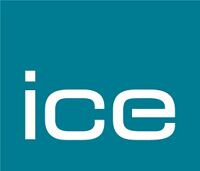
The Institution of Civil Engineers
ICE has been working hard to promote the profession of civil engineering for over 200 years.

Engineering Council Accredited Degree
This Civil Engineering BEng (Hons) degree course is accredited by the Engineering Council.
Site visits
As part of the course you will be given the opportunity to go on site visits with professional partners, where you can apply your course knowledge and experience real-world situations to enhance your studies. Previous visits have included Taylor Wimpey, CBRe, Cushman and Wakefield and RICS.
Civil Engineering students explore HS2 construction site metres away from city centre campus
Civil Engineering students from Birmingham City University (BCU) have been given first-hand experience of a HS2 construction site, metres away from their usual classroom.
Employability
Enhancing your employability skills
We will develop the skills, understandings and personal attributes that will help you stand out from the crowd when it comes to securing employment.
We will ensure you are professional, work-ready and enterprising, with a global outlook and the ability to solve problems creatively.
This course has been mapped against the UKSpec subject benchmarks for engineering, and we will support you to work towards a range of competencies linked to these benchmarks. We will also support your readiness for work by offering placements, where you can gain vital work experience in a real-life business.
Birmingham City University also has the Graduate+ scheme, an extracurricular programme which has been designed to hone the subject-based skills you develop throughout the programme alongside broader employability skills. You’ll develop skills in CV writing, presentations, a portfolio and more.
Our students also have the opportunity to fill many part-time temporary positions within the University. This allows you to work while you study with us, fitting the job around your course commitments. By taking part, you will gain valuable experiences and employability skills, enhancing your prospects in the job market.
Placements
With the advantage of a construction site right on our doorstep as the University grows, students and graduates have benefited from placements and hands-on experience.
You will also benefit from the innovative Building Birmingham Scholarship programme. Launched by Birmingham City Council, it supports young people wishing to pursue a career in construction.
The Faculty has committed to ensuring that all students who would like to take out a third year in industry will be provided with that opportunity. This is not compulsory, but certainly is recommended since this can have positive implications for your future employability and sometimes even provides sponsorship.
How Has Birmingham’s Built Environment Accelerated the City?
The UK’s second city is thriving, read how the built environment is at the root of its success.
My experience as a female Engineer working for Jaguar Land Rover
Alessandra, an Engineering graduate, tells us about her experience as a female engineer working in the industry and how she adds perspective and value to any team, as well as how useful she found her course.
Innovation Fest
Innovation Fest is designed to foster entrepreneurship and support the development of our first-year students as future world-changers. The festival contributes to the knowledge economy, increasing students’ employability by providing genuine portfolio material.
Facilities & Staff
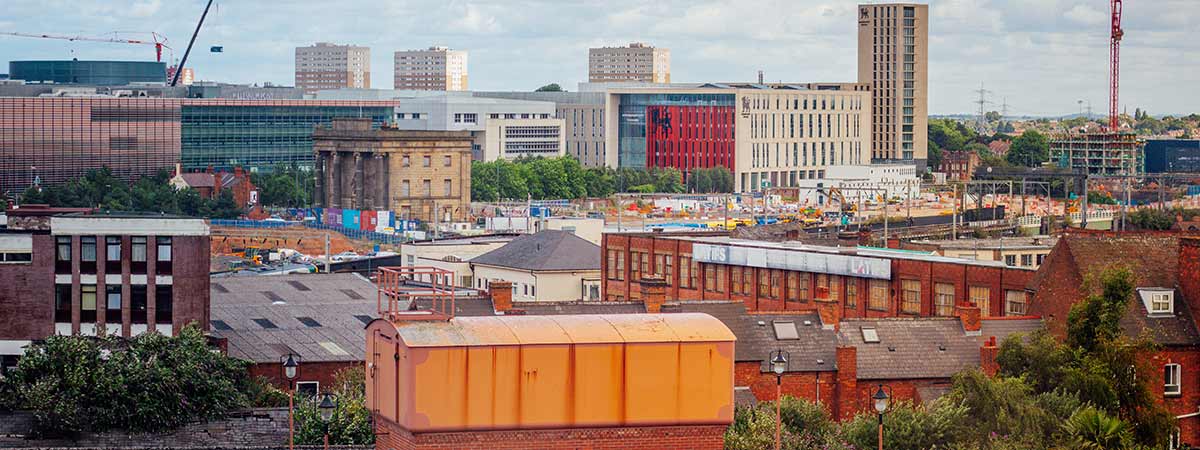
The facility our students value most is not actually on campus, but is the location of the campus in the heart of Birmingham’s Eastside opposite the new High Speed 2 station construction, and minutes from dozens of fascinating live projects within the city centre.
Birmingham as it changes constantly on our doorstep really is our ‘living lab’. By simply looking out the window of our classrooms you’ll be able to witness live projects as they’re happening around us. You’ll constantly be inspired by dozens of fascinating case studies just from walking from the station to the campus.
The facilities on offer to our students reflect the work environment you will enter as you start your career. Learn more about what we have to offer below.
Our staff
Dr Andy Lim
Lecturer in Civil Engineering
Andy is a Lecturer in Civil Engineering at Birmingham City University. Prior to joining BCU Andy was a Research Officer in the ”Advanced Sustainable Manufacturing Technologies (ASTUTE)" project in the College of Engineering at Swansea University. He was also a Teaching Associate and Lecturer at London South Bank University.
More about AndyDr Panagiotis Patlakas
Associate Professor in Civil Engineering
Panagiotis has a multi-disciplinary background with qualifications in structural engineering and architectural studies, and a track record in information technology and software engineering for Architecture, Engineering, and Construction (AEC).
More about PanagiotisForoogh Hajiseyedjavadi
Lecturer
Foroogh is a lecturer in Civil Engineering at the Department of Built Environment and a visiting research fellow at the University of Leeds. She has a PhD in Civil Engineering with the focus on Transportation Engineering from the University of Massachusetts Amherst, MA, where she also worked as a research and teaching assistant.
More about ForooghShuyin Feng
Lecturer in Civil Engineering
Shuyin is a Lecturer in Civil Engineering at the Department of Built Environment. She received her PhD and MSc by research in Civil Engineering from the University of Bristol, UK in 2022 and 2017, respectively.
More about Shuyin







